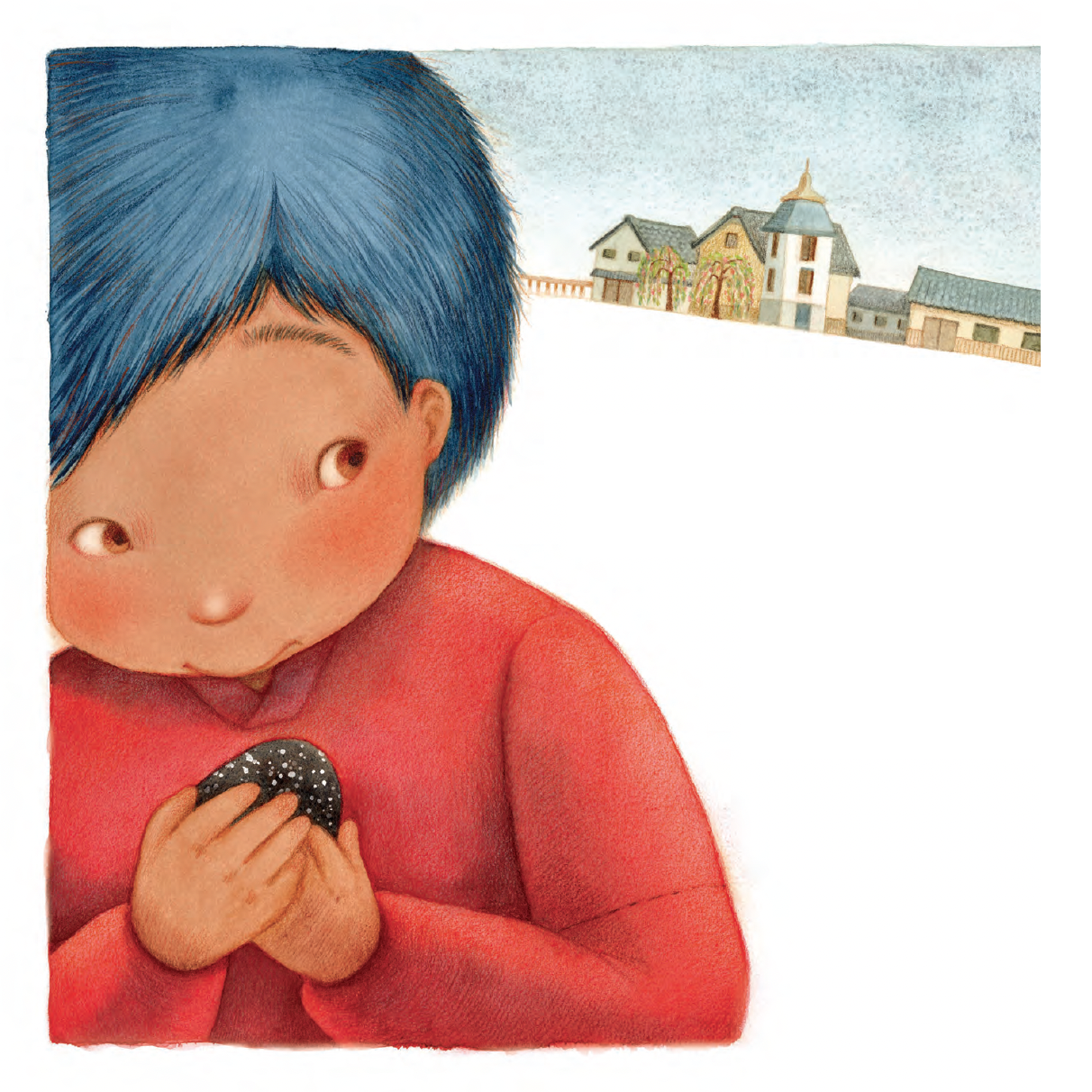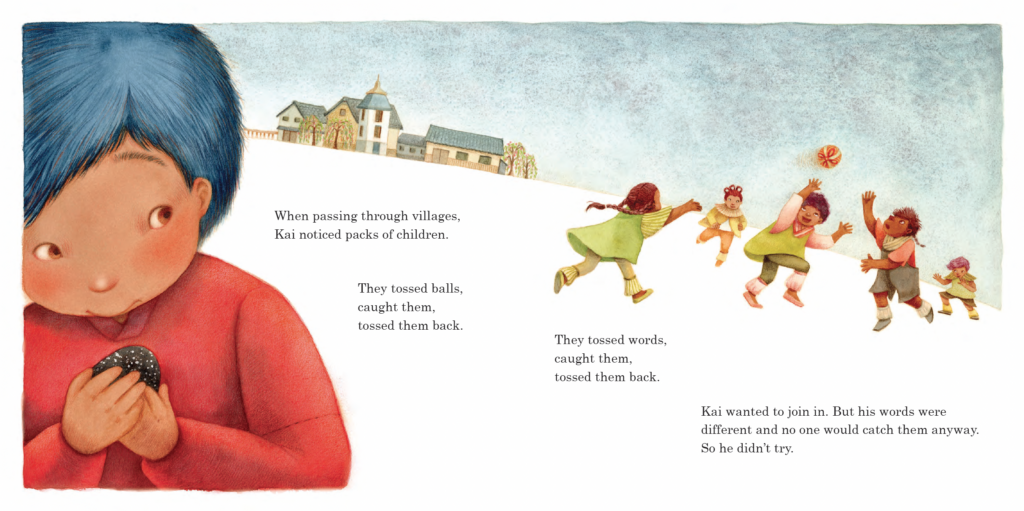
April 5, 2024
Between Words and Worlds

Pages from BETWEEN WORDS, where Kai feels hesitant to join other children because of his language barrier
Feeling like a misfit is something that I think most of us can identify with in different ways. For seven-year-old me, not knowing the right words to say (compounded with looking and feeling different) was intimately linked to my outsider complex. Other kids calling me “gaijin” (foreigner) in Japanese elementary schools because I couldn’t pronounce words correctly, and strangers remarking that I was a “Chinita” on the streets of Mexico City (even when I spoke immaculate Spanish) entrenched my perception that I couldn’t belong anywhere.
When doing some internal research about the heart of my book, Between Words, I was surprised to learn from my parents that my first language was Spanish. I’d heard recordings of five-year-old Saki fluently singing “Pinpon es un muñeco” to my baby brother, but didn’t realize this preceded my assimilation of Japanese or even English (as we’d moved to the U.S. when I was just a few months old). Add a six-year stint of learning English at an international school in France, trying to wrap my head around why some words like “Arkansas” and “colonel” sound nothing like what you assume they should; being the odd duck among mostly blonde, blue-eyed, fair-skinned peers; forced to enroll in Japanese school over the summer where my average grade was an epic FAIL; enduring innumerable reactions ranging from disbelief to scorn at my lack of familiarity with some celebrity/TV show/whatever trending pop-culture topic du jour; and PRESTO: behold the makings of a lifelong inferiority complex and perennial fear of saying the “wrong” thing 😂! While painful, these feelings I unearthed became helpful source material for the journey Kai goes on in the book.
I’ve been slowly transmuting this anxiety into the handy skill of being able to laugh at myself. It helps that getting older makes you take yourself less seriously. Just last night, I was telling my partner that I needed to read before going to bed so I can “decompose” after a grueling, admin-filled day. She looked at me with mock concern and replied “I hope you mean decompress. I’d hate it if you decomposed. Gross.” BAHAHAHAHA. These feelings of levity are what I try to remember when big group texts stir up my childhood “stage fright,” or when my palms get sweaty literally every time I’m about to post anything on IG. *Cue the world’s smallest violin.*
There are many insightful articles out there about the benefits of bilingual brains and multi-cultural lifestyles. I know how lucky I was and realize how much of a privileged life I’ve lived. I wouldn’t trade the (literally) horizon-widening experiences and unique mix of cultural references my transient upbringing gave me access to, or the third-culture mindset that helps me open myself up to POVs beyond the binary and (on good days) a willingness to hold two opposing truths at the same time.
And. Also. (Speaking of holding opposing truths…)
I hated it as a kid.
When I was seven years old, I didn’t care that we were moving to “FRANCE: the cultural capital of the Western World.” I missed my onigiri (riceballs) with umeboshi (pickled plums) wrapped in nori (seaweed). I missed being able to step out of our government subsidized housing so I could run amok in the very safe neighborhoods of Tokyo without adult supervision. I missed manga and anime (though admittedly, it was a trip getting to watch Goku’s spats with Vegeta dubbed in French on Club Dorothée).
The good news is the world has continued to become more connected and cross-cultural since the 90s. A lot of children can now reap the benefits of growing up around globally diverse influences and worldviews without being uprooted. And every kid is different. I bet there are more evolved, self-assured kiddos out there that are thriving because they got to move from place to place. I just wasn’t one of them. 😕
Speaking of benefits, having to think in different languages gave me a unique filter through which I saw the world. It made little Saki wonder why so many words don’t have direct translations in other languages and question the absurdity of why certain words sound the way they do (in another life I might’ve been an etymologist). It’s only recently that I realized I still play with this conundrum by exaggerating or deconstructing certain sounds intentionally (e.g. in our household, “good” has become “gyudd,” “this” is “dis,” “thanks” is pronounced “tanks,” and “like” is often “yike”) which may be another way I’ve been subliminally coping with my complex. (You can’t make fun of me for saying it wrong if I’m making fun of the word first and saying it wrong on purpose. Ha.)
When you stop to think about it though, this is a powerful way to establish a unique lexicon for connection and belonging — like secret languages we used to make up with our friends as kids. Nuances around how we communicate can define who we are and aren’t (in Japanese there are THREE separate variations of words to pick from depending on whom you’re speaking to: the version you use with a peer, the version you use in deference to someone hierarchically “above” you, and the version you use to “lower” yourself as an act of humility 🤯). Does a certain accent immediately make you feel at home? Do abbreviations (giggs 🤭) or a specific choice of words unite you and a particular group of friends? How does the way you communicate with others define who you are and what community you belong to? Do you share a special or secret language with your family or friends? How does having one make you feel?
In retrospect, I realize how much my relationship to language has evolved from contentious to limitless. Not having words used to feel like an achilles heel that shrank my world, separating me from everyone else. It turns out it was exactly what I needed to question why communication had to be confined to these funny little syllables. It encouraged me to invent my own ways of expressing myself and connecting with others; whether through interpretive dance, or making up games, or painting entire worlds I could belong in and invite people into — some of them have become my superpowers! These skills and my perception of what language can be, continues to shift, morph, and expand. Words and language aren’t walls that separate me from others. They are the doors that connect us. Or (turns out today’s a good day), in their most mysterious and magnificently complex manifestation, they are both.
Hayyyyyy!
BAHAHAHA
This book is so beautifully illustrated and the story resonates on so many levels! Thank you for sharing it with the world, and your deep digging in order to figure out how to add so much heart.
I’m feeling really grateful to you for sharing so much of your background, your insecurities and some of the insights you’ve gained as an adult processing childhood difficulties. It’s so interesting to think about how hard it can be for people to do the things they want to ultimately be able to do! Your circumstances as a kid helped you develop the ability to understand that culture, race, language, none of it is binary! So many of us are still trying to untangle and unpack the absolutisms we grew up believing, especially those of us who grew up in excessively individualistic/xenophobic/racist/patriarchal/etc. cultures.
Easily seeing that things aren’t the binary that economies, power structures and institutions insist they are is beautifully expansive, and simultaneously makes us feel alone and misunderstood in a lot of scenarios. I’m so glad we have Kai as a representative of the tender, kind, curious, fearful part of what we all have inside us, and this hopeful story!
I feel like a lot of us are looking for ways to transform from the harmful paradigms of previous generations, while keeping the connective, inspiring and meaningful parts.
Also can we get a post about Interpretive Dance as Superpower please?!
Oh man. Thank you for such a thoughtful comment, Bear 😭!! 100% agree with how so many of us are “still trying to untangle and unpack the absolutisms we grew up believing”… it will probs end up being a lifelong journey of unlearning these limiting paradigms and remembering/excavating who we always were. But how lucky are we that we get to turn all this crap into story compost along the way???
And YES. I will totally post something about my childhood “interpretive dance” sessions at some point. Lil Sak was very good at following her urges to move when inspired by music. 🤭
eeeeeeee! I’m SO happy to hear this! How about adult Saki?!